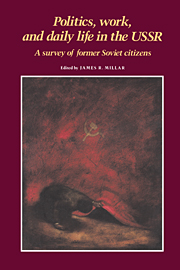Book contents
- Frontmatter
- Contents
- Foreword
- List of contributors
- PART I INTRODUCTION
- PART II POLITICS: SOURCES OF REGIME SUPPORT
- 3 Politics, generations, and change in the USSR
- 4 Political beliefs of the Soviet citizen: sources of support for regime norms
- 5 The attentive public for Soviet science and technology
- PART III WORK: ECONOMIC/DEMOGRAPHIC TRENDS
- PART IV LIFE: SOCIAL STATUS, ETHNIC RELATIONS, AND MOBILIZED PARTICIPATION
- Appendix A The SIP General Survey sample
- Appendix B Response effects in SIP's General Survey of Soviet emigrants
- Glossary
- General bibliography of Soviet Interview Project publications
- Index
5 - The attentive public for Soviet science and technology
Published online by Cambridge University Press: 21 March 2010
- Frontmatter
- Contents
- Foreword
- List of contributors
- PART I INTRODUCTION
- PART II POLITICS: SOURCES OF REGIME SUPPORT
- 3 Politics, generations, and change in the USSR
- 4 Political beliefs of the Soviet citizen: sources of support for regime norms
- 5 The attentive public for Soviet science and technology
- PART III WORK: ECONOMIC/DEMOGRAPHIC TRENDS
- PART IV LIFE: SOCIAL STATUS, ETHNIC RELATIONS, AND MOBILIZED PARTICIPATION
- Appendix A The SIP General Survey sample
- Appendix B Response effects in SIP's General Survey of Soviet emigrants
- Glossary
- General bibliography of Soviet Interview Project publications
- Index
Summary
With the recognition of scientific and technological change as central components of national and international policies, scholars, policy makers, and public opinion specialists in the United States have studied the views of the American public toward science and technology since the late 1950s. There have been no comparable studies of the Soviet public, despite the fact that science, and technology play a prominent role in the official view of Soviet historical development. Soviet leaders have promoted the idea of a scientific-technical revolution and the importance of science as a key to the Communist future. Yet, we do not know whether the regime's message has had the desired impact on citizen attitudes toward science, technology, and public policy. The Soviet Interview Project (SIP) has provided us with the first opportunity to see if there is an attentive public for Soviet science and technology, at least among a small but significant segment of the Soviet population.
American research on citizen attitudes in the United States demonstrates that different issues generate different levels of attentiveness on the part of the general public. People who are more educated tend to have a broader range of issue awareness, and they tend to be more attentive (than the less educated) to issues that are perceived as specialized or less directly relevant to one's daily life. The “attentive public” for science and technology – that is, the portion of the population interested in, and knowledgeable about, science and technology issues – provides a potential base for informed support and criticism of regime policy.
- Type
- Chapter
- Information
- Politics, Work, and Daily Life in the USSRA Survey of Former Soviet Citizens, pp. 142 - 168Publisher: Cambridge University PressPrint publication year: 1987
- 1
- Cited by

